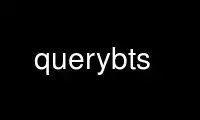
This is the command querybts that can be run in the OnWorks free hosting provider using one of our multiple free online workstations such as Ubuntu Online, Fedora Online, Windows online emulator or MAC OS online emulator
PROGRAM:
NAME
querybts - view outstanding bug reports on a debbugs server
SYNOPSIS
querybts [options] <package | number [number2]...>
DESCRIPTION
querybts is designed to provide a convenient and easy-to-use interface to the Debbugs bug
tracking system, as used by Debian and several other projects. You can specify a package
name or one or more report numbers.
OPTIONS
The program follows the usual GNU command line syntax, with long options starting with two
dashes (`--'). A summary of options are included below.
-h, --help
Show summary of options.
--version
Show the version of querybts and exit.
-A, --archive
Browse archived bugs instead of current reports. Debbugs servers clear out closed
reports after 28 days and place them in a separate archive; this option allows
those older, resolved reports to be viewed (at least for servers that maintain an
archive).
-B SYSTEM, --bts=SYSTEM
Instead of the Debian bug server, use the server specified by SYSTEM. Valid
options are default and debian but check --help for an updated list.
-b, --buglist
Display a bugs list for the given package.
--latest-first
Display the bug reports list sorted and with the latest reports at the top.
--mbox-reader-cmd=MBOX_READER_CMD
Specify a command to open the bug reports mbox file. You can use %s to substitute
the mbox file to be used, and %% to insert a literal percent sign. If no %s is
specified, the mbox file name is supplied at the end of the argument list.
-m, --mbox
Retrieve the given bug number(s) or package name(s) as a mailbox file, instead of
viewing it. It will be dumped to standard output.
--proxy=PROXY, --http_proxy=PROXY
Specify the WWW proxy server to use to handle the queries to the bug tracking
system. You should only need this parameter if you are behind a firewall.
-s, --source
Query on source packages, rather than binary packages.
--timeout=SECONDS
Specify the network timeout, the number of seconds to wait for a resource to
respond. If nothing is specified, a default timeout of 1 minute is selected.
In case of a network error, there are chances it's due to a too low timeout: try
passing the --timeout option with a higher value than default.
-u INTERFACE, --ui=INTERFACE, --interface=INTERFACE
Specify the user interface to use. Valid options are text, urwid, gtk2; default is
taken from the reportbug configuration files.
-w, --web
Launch a web browser to view bug reports, instead of using the internal interface.
This will also allow you to see the whole discussion about a particular bug at
once, instead of one message at a time as querybts would do. (Only the first bug
number on the command line will be opened.)
CONFIGURATION FILES
querybts supports a simple run control file syntax. Commands are read from
/etc/reportbug.conf and $HOME/.reportbugrc with commands in the latter overriding those in
the former.
Commands are not case sensitive, and currently take 0 or 1 argument; arguments containing
whitespace must be enclosed in quotes.
Any line starting with # is taken to be a comment and will be ignored.
Generally, options corresponding to the long options for querybts are supported, without
leading -- sequences. See the default /etc/reportbug.conf for all acceptable options and
reportbug.conf(5) for all acceptable options and detailed information.
Options only supported by reportbug will be silently ignored.
ENVIRONMENT
http_proxy
Provides the address of a proxy server to handle the BTS query. This should be a
valid http URL for a proxy server, including any required port number (simply
specifying a hostname, or omitting a port other than 80, WILL NOT WORK).
Use querybts online using onworks.net services
